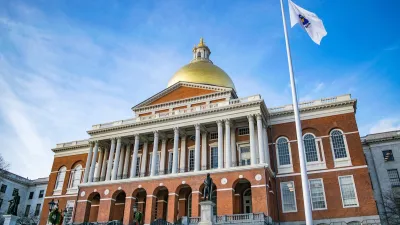The Oregon Legislature adjourned this week with no actions regarding the Columbia River Crossing—a controversial project with opponents on either side of the aisle.
“The Oregon Department of Transportation announced Friday it is closing the I-5 bridge project's offices, issuing cease-work orders to its many contractors and shutting the project down entirely by May 31,” writes Jeff Manning.
“The end comes after more than a decade of work and nearly $190 million worth of planning, engineering, financial and traffic forecasting and other work.”
An unlikely coalition of political interests opposed the project, according to Manning: “The project’s demise is an enormous victory for both environmental and urban planning groups from the left and conservative fiscal hawks from the right. This Green Tea Party, as they came to call themselves, attacked the project as a wasteful, bloated plan that was financially imprudent and promoted sprawl.”
In a separate article on the Seattle Transit Blog, Frank Chiachiere argues that recent highway projects have taken on too much complexity: “In an effort to mollify an ever-growing list of stakeholders, planners keep adding features – lanes, off-ramps, lids, walls – until the project gets too expensive and collapses (metaphorically speaking) like a Christmas tree with too many ornaments.”
FULL STORY: Columbia River Crossing: ODOT to pull plug, bridge project is dead

Planetizen Federal Action Tracker
A weekly monitor of how Trump’s orders and actions are impacting planners and planning in America.

Maui's Vacation Rental Debate Turns Ugly
Verbal attacks, misinformation campaigns and fistfights plague a high-stakes debate to convert thousands of vacation rentals into long-term housing.

Restaurant Patios Were a Pandemic Win — Why Were They so Hard to Keep?
Social distancing requirements and changes in travel patterns prompted cities to pilot new uses for street and sidewalk space. Then it got complicated.

In California Battle of Housing vs. Environment, Housing Just Won
A new state law significantly limits the power of CEQA, an environmental review law that served as a powerful tool for blocking new development.

Boulder Eliminates Parking Minimums Citywide
Officials estimate the cost of building a single underground parking space at up to $100,000.

Orange County, Florida Adopts Largest US “Sprawl Repair” Code
The ‘Orange Code’ seeks to rectify decades of sprawl-inducing, car-oriented development.
Urban Design for Planners 1: Software Tools
This six-course series explores essential urban design concepts using open source software and equips planners with the tools they need to participate fully in the urban design process.
Planning for Universal Design
Learn the tools for implementing Universal Design in planning regulations.
Heyer Gruel & Associates PA
JM Goldson LLC
Custer County Colorado
City of Camden Redevelopment Agency
City of Astoria
Transportation Research & Education Center (TREC) at Portland State University
Jefferson Parish Government
Camden Redevelopment Agency
City of Claremont




























